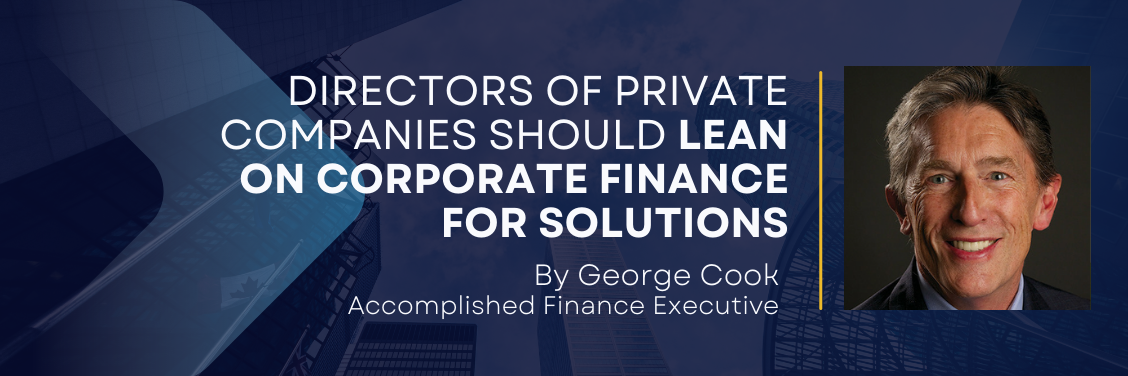Directors of Private Companies Should LEAN on Corporate Finance for Solutions

When it comes to directors and private companies, we’ve seen the lists:
- Best practices for Family Companies
- Best practices for Independent Directors
- Shareholder/Board Roles in Private Companies
- Increasing the Value-Add from your Board
Even the PDA website contains several lists.
The best practices list should include corporate finance, which is frequently the centerpiece of shareholder/director interactions. Yet, corporate finance matters are often undervalued by private company boards as a place to add value.
The reality is that the sub-parts of corporate finance touch most areas of shareholder concerns — 1) overall company growth, 2) cash distributions, 3) capital expenditures, 4) diversification, 5) philanthropy and 6) generational transfer/estate tax planning. These are complicated subjects that do not act independently. All need capital to implement, generally from the same pool of funds.
What exactly is corporate finance?
- Corporate finance is concerned with the investment in company projects using shareholder and outside money. Prioritization of projects and the cost of outside money are the keys to analysis.
- Capital can accomplish much more when shareholder money combines with outside funds.
- For the shareholders, the combination can accomplish any number of goals — funding growth, estate planning, acquisitions, cash distributions, philanthropy, and diversification.
- Shareholders can take on several goals at one time. However, goals are interrelated since they all share the same pool of money.
- The financial returns of new investments must be carefully managed, due to the cost and other limitations of outside capital.
Shareholder-directors sometimes have little experience with how to approach the prioritization of goals or how to begin the analysis. Usually, this is due to their lack of exposure to the basic concepts of finance. They may also receive pressure from non-director shareholders. At its worst, this results in missed opportunities when choices are not well understood. Missed opportunities can compound and lower the funding of new opportunities down the road.
Independent Directors Can Help!
The CFO plays a key role in identifying sources of capital. The independent directors of private companies can also help shareholder-directors deepen their understanding of corporate finance to help them sort out their alternatives. Understanding the long-term benefits of allocating capital to priorities today can make a beneficial difference for the future, as the board better understands what the company generates in annual capital, the outside choices of money, and the trade-offs of bringing in outside capital. These can be key areas of value-add by the independent director.
Crucial decisions include how fast to grow the company and the trade-offs of funding. The outcomes give feedback on the company's future and its essential ability to pursue its priorities. The company is often where most of the cash comes from. Calibrating the company's growth and its funding is the "crème de la crème" of importance.
The following framework can guide analysis and discussion of company growth:
- The concept of earning assets. These are the non-cash assets, such as A/R, inventories, fixed assets, deployed in the business to "make money."
- The financial returns on the earning assets. "Money made" on earning assets is usually expressed as a percent return.
- The concept of the capital stack. These funding sources must equal earning assets.
- The cost of the capital stack. This is a blended cost, which must be less than the financial return provided by the earning assets. Other sources include various types of debt and non-family junior equity.
Directors can use these concepts to address very critical topics for shareholders:
Earning Assets and their Financial Return (1 and 2 above).
- What opportunities does the company have?
- Should growth of the balance sheet and earning assets be via acquisition or internal investment?
- What is the expected financial return on the new assets, and how will that affect the blended return on all earning investments?
- Will multiple opportunities be available? Should we take all of them?
- If the choice is to enlarge the earnings assets, what is the source of the funding?
- How much of the capital needed will the company itself generate in the near term?
- If outside capital is needed, do the company's existing capital providers have more capacity?
- Will new capital providers be needed?
- What is the cost of the new capital, and will the credit profile of the company change?
- Finally, how does the blended cost of all capital compare to the blended return on all earning assets?
These are all concepts of corporate finance. By leaning on corporate finance, Directors can help shareholders choose what's in the best long-term interest of the company. From there, specific choices can be made for other areas of capital needs, such as cash distributions, philanthropy, and estate planning. Introducing corporate finance principles into the capital allocation process will strengthen shareholders’ knowledge of the trade-offs presented by these choices, and increase the value-add of the independent director.

ABOUT GEORGE COOK
George Cook is an accomplished finance executive with broad experience. He is currently involved in financial advisory work and board of directors’ service. While one of George’s experiences was as a public company CFO, most of his CFO years were at the private company level. Prior to joining MacLean-Fogg, Mr. Cook served as SVP and CFO of Boulevard Bancorp, Inc., and before that was an executive at IFINT, a New-York based private equity firm. He is the former chair of the finance committee and audit committees of Condell Hospital, is the past president of the Chicago Chapter of Financial Executives International and has served on numerous boards of directors. Mr. Cook graduated from Southern Illinois University in 1973 with BS degrees in Finance and Accounting. He became a CPA in 1974. In 1979, he received an MBA from Northern Illinois University and a MS in Taxation (MST) from the same university in 2003. The focus of his advisory business is building financial organizations, raising capital, and completing acquisitions for private companies. [email protected].
